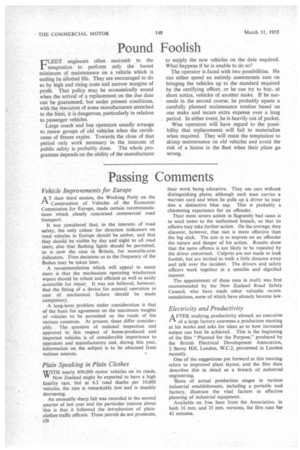Pound Foolish
Page 28

If you've noticed an error in this article please click here to report it so we can fix it.
"ELEET engineers often succumb to the temptation to perform only the barest minimum of maintenance on a vehicle which is ending its allotted life. They are encouraged to do so by high and rising costs and narrow margins of profit. That policy may be economically sound when the arrival of a replacement on the due date can be guaranteed, but under present conditions, with the resources of some manufacturers stretched to the Emit, it is dangerous, particularly in relation to passenger vehicles.
Large coach and bus operators usually arrange to renew groups of old vehicles when the certificates of fitness expire. Towarda the close of that period only work necessary in the interests of public safety is probably done. The whole programme depends on the ability of the manufacturer to supply the new vehicles on the date required. What happens if he is unable to do so?
The operator is faced with two possibilities. He can either spend an entirely uneconomic sum on bringing the vehicles up to the standard required by the certifying officer, or he can try to buy, at • short notice, vehicles of another make. If he succeeds in the second course, he probably upsets a • carefully planned maintenance routine based on one make and incurs extra expense over a long period. In either event, he is heavily out of pocket. Wise operators will have regard to the possibility that replacements will fail to materialize when required. They will resist the temptation to skimp maintenance on old vehicles and avoid the risk of a hiatus in the fleet when their plans go wrong.




























































































